State Budget
TRU is fighting to increase transit funding in the Michigan state budget.
For years, the amount of funding the state gives transit agencies to operate buses (Local Bus Operation, or LBO) has been declining. While the state used to provide near the full 60% of local bus operations for rural agencies, and 50% for urban, this has decreased over the decades to half of full funding.
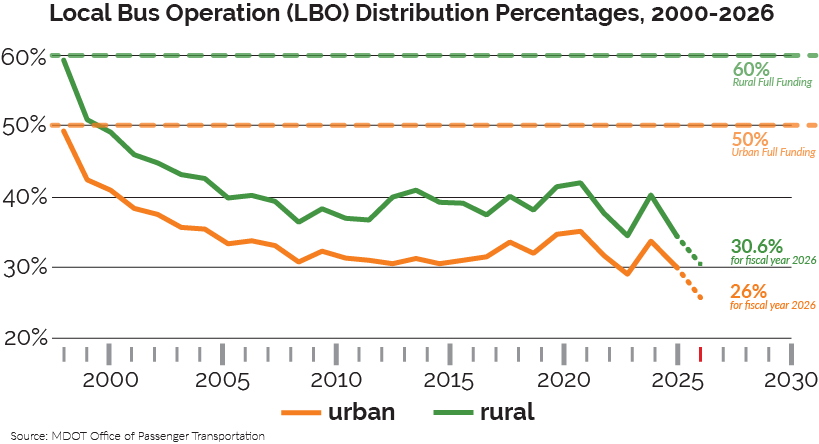
FY26 Budget Update: The FY26 budget brings LBO funding to nearly $300M – up from $226M in FY25, and includes $65M for transformational transit projects. Read more here. A major win, but we’ll be pushing for it to continue growing to the full amount next year!
Another high priority item is restoring the transfer of funds from the MTF to the CTF. While the actual dollar amount has increased slightly, this is far less than agencies should be getting. 10% of the MTF should be transferred to the CTF, but as of 2021, just over 7% was.
If Michigan wants a truly great transportation system, we need to double state funding for transit.
We need to restore full LBO funding ($440M in FY26), and invest $300M a year into rail, intercity bus, senior services, and ferries.
How does Michigan fund Transportation?
Transportation funding in Michigan is complicated. There are many different pots of money and funding sources.
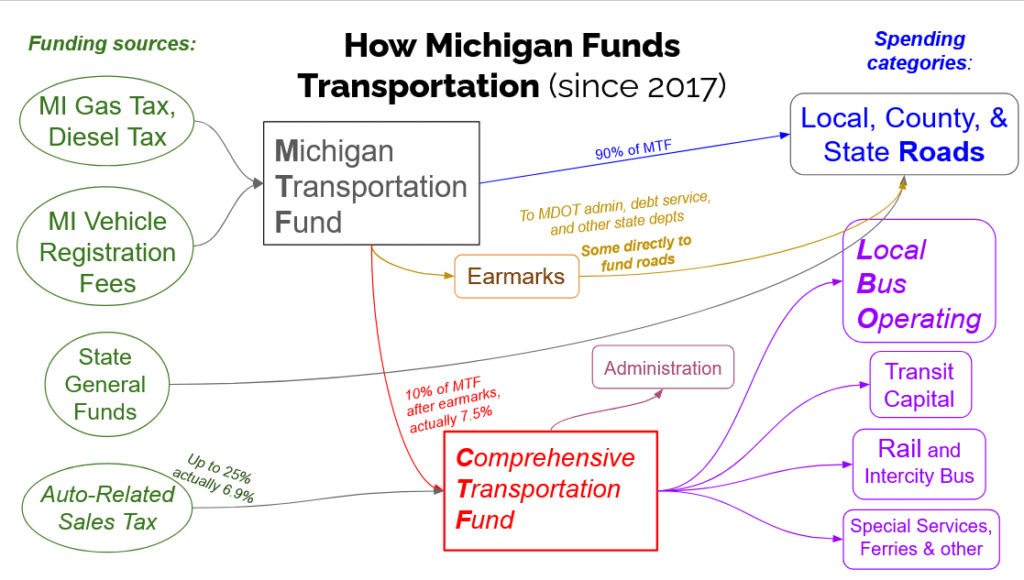
Transit and all non-roads transportation are currently funded by 6.9% of the Auto-Related Sales Tax, and 7.5% of the Michigan Transportation Fund (MTF). This money is pooled into the Comprehensive Transportation Fund (CTF). The CTF is the source for LBO, transit capita, rail and intercity bus, and special services like ferries, senior services, and other transportation modes.
In contrast, roads are funded by countless sources: 90% of the MTF goes to roads, and the MTF is funded by the state gas tax, diesel tax, and vehicle registration fees. Another 2.5% of MTF funds is earmarked, with some of this going to fund roads. No current earmarks go to fund transit.
Public Act 51 (PA51) of 1951 established the MTF and the CTF. This act calls for 10% of the MTF to be transferred to the CTF – much higher than the 7.5% the CTF actually gets. This percentage has also decreased in recent years – while previously stagnant near 8.5%, since 2018 this has declined to the current 7.5%.
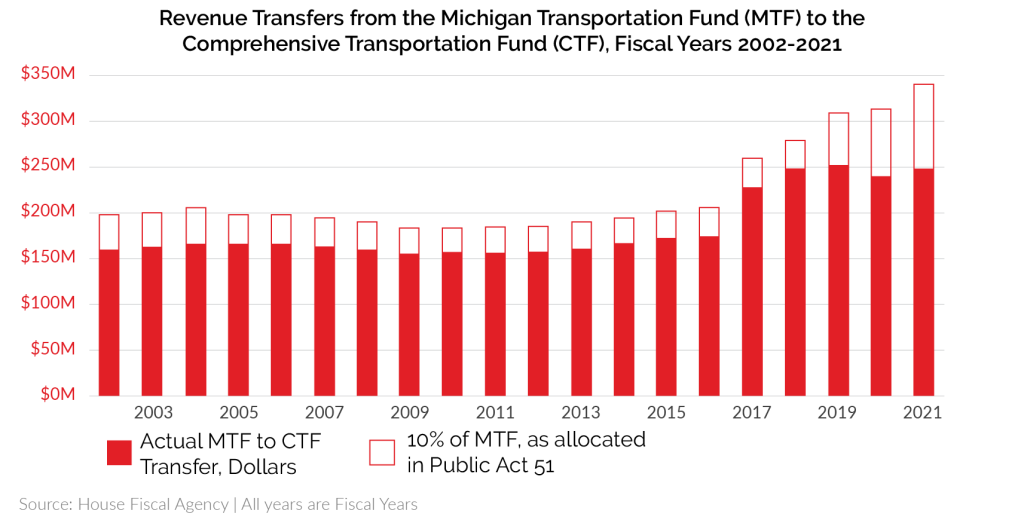
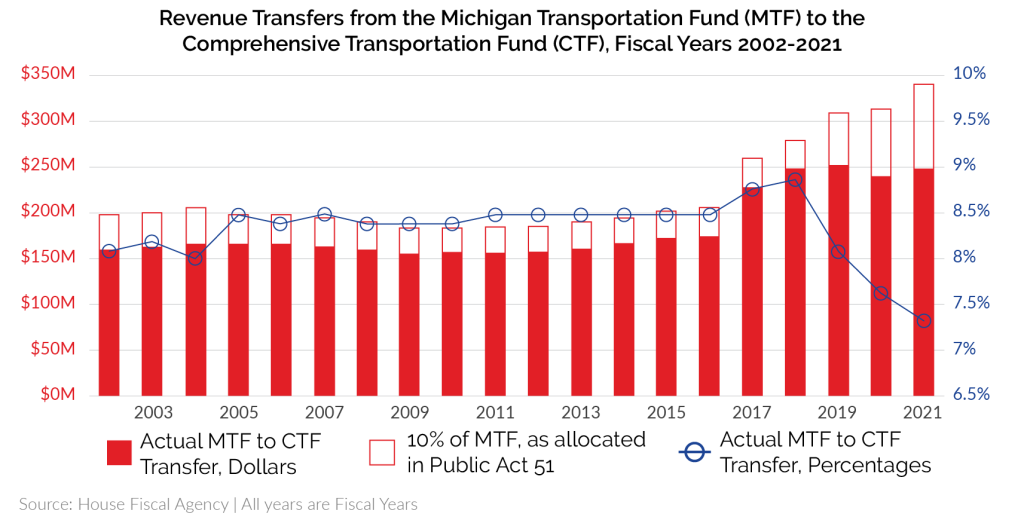
Additionally, transit can receive up to 25% of auto-related sales tax… but only receives 6.9%. If we allocated the full 25% of auto-related sales tax and the 10% of the MTF to CTF transfer, we could fully fund LBO this year.
Since 2017, there has been a widening disparity between road funding and transit funding. We shouldn’t have to choose one over the other, and road funding presents an alternative method to ensure transit gets the full funding it deserves.
Road Funding
Governor Whitmer’s MI Road Ahead plan proposed $3 billion a year in Michigan’s transportation infrastructure for FY26, with $250 million of that going to bus transit and rail!
We’re fighting to ensure that any road funding package includes a 10% investment in transit – just like the Governor’s initial proposal.
FY26 Budget Update: The $1.8B road deal included $160M for transit, aka 8.9% out of a maximum 10%! Read more here. Next year, we’ll fight to make sure any future transportation investments continues to invest 10% towards transit.
TRU and our allies are calling on any road funding deal to:
- Invest in the full transportation system (including transit, rail, ferries, pedestrian and bicycling infrastructure, senior services, etc)
- Not penalize more efficient vehicles
- Not harm other essential services like schools and municipalities
- Invest in ‘Fix it First’ approach before expanding roadways
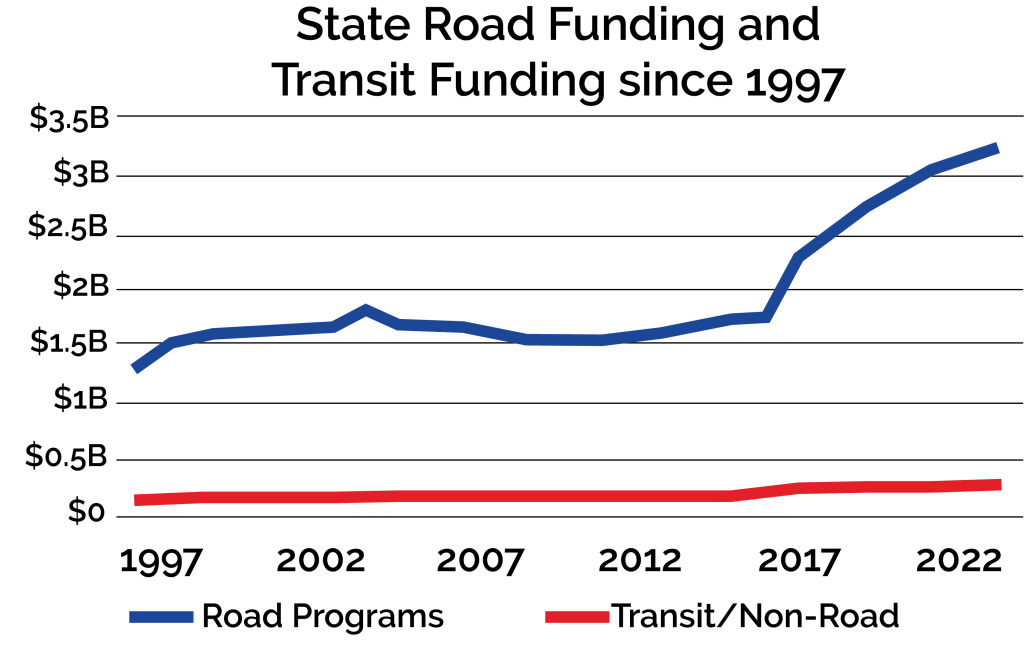
Modernizing MDOT
The Michigan Department of Transportation (MDOT) has a lot of discretion in these funding decisions. In addition to our legislative budget efforts, we’re aiming to reform MDOT into a modern department of transportation that invests in people, not just pavement.
MDOT should prioritize safety, access, and the environment in selecting transportation projects. A truly modern MDOT is one that has a mode neutral project selection process, invest in multimodal transportation, and can quantify and increase transit access and quality across Michigan.
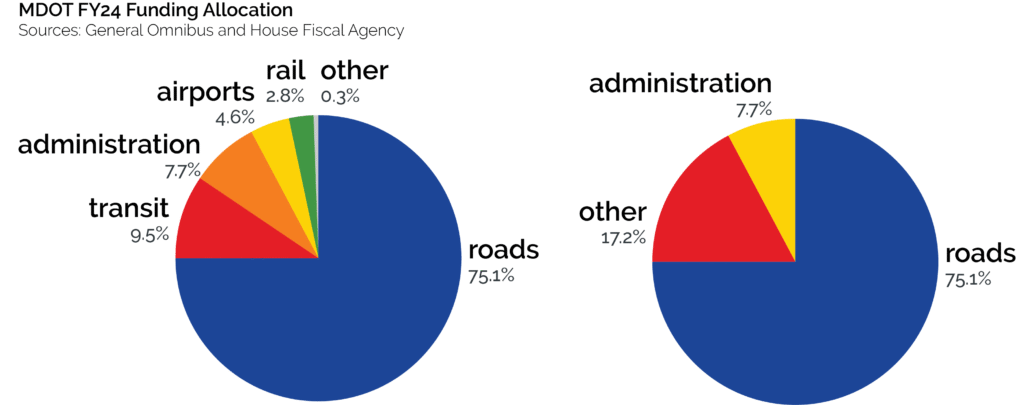
Clean RIDES Network – Michigan
TRU is proud to join a dozen groups across Michigan and over 100 organizations nationwide to launch the Clean RIDES Network (Responsible Investments to Decrease Emissions in States), the first-of-its-kind network focused on large-scale, durable, multi-state transportation reform. Clean RIDES states include Michigan, Illinois, Minnesota, Pennsylvania, Maryland, New York, and California, which all have ambitious goals to reduce climate pollution and opportunities to improve state transportation policies to meet those goals.

TRU and the Ecology Center lead the Clean RIDES Network in Michigan. We’re pushing for Michigan state-level policy to:
- Expand bus and train routes and transition bus fleets to electric
- Require MDOT to account for climate emissions that could result from road expansion projects or decreases from multimodal projects that reduce driving
- Require all projects requesting transportation funding be reviewed through the same quantifiable, transparent, and outcome based evaluation
In addition to those transportation policy focused efforts, we’re advocating to:
- Reduce barriers to active transportation like offering e-bike incentives and implementing robust Complete Streets plans
- Eliminate parking minimums
- Increase Transit-Orientated Development (TOD)
- Make strategic investments to accelerate adoption of electric vehicles, offer electric car-share, and ensure access to convenient charging options
What Can You Do?
Call your state senators and representatives! Letting your legislators know that you support modernizing MDOT, funding transit, and supporting people over pavement is crucial.
